Peaks and Troughs
While I was travelling over the Andean mountains soaking in the majestic sceneries and virtually out of touch with the financial world for over 10 weeks, the PMs market seemed to be having its own mountain-valley experience. Unknown to me, gold and silver took a 15 and 24 percent plunge respectively against the USD towards the end of the year. While they were down against most fiat currencies, it did not affect me, nor others who’ve saved and done their accounting in ounces of gold and silver. Not one bit. Neither did they do us much good when their USD prices soared 11% and 19% respectively in January. Life goes on while the powers that be continue to play their paper shenanigans.
For the benefit of readers who continue to do their accounting in units of fiat currencies, I’ve summarised the performance of gold and silver in several currencies through the charts below. Hope they help to put things into perspective.
-
Gold & silver performance relative to various currencies in 2011
In 2011, gold appreciated by an average of 14.3% against all 75 fiat currencies tracked by goldsilver.com, while silver averaged a corresponding loss of 6.8%. Among the selected currencies of interest charted above, only the Indian Rupee recorded a loss against both gold and silver.
-
Gold & silver performance over 12 years
Going back to the beginning of this secular bull market in PMs, both gold and silver charted impressive gains against all tracked currencies. If you’ve been earning or saving in Indian Rupees over the past 12 years, you’d have lost over 500% against both gold and silver. If you think the Indian Rupee had it bad, spare a thought for those who’ve saved in Iranian Rial or Argentinian Peso, which depreciated by 3,368% and 2,240% respectively against gold.
Gold & silver performance before April’s price take downs
Silver’s 2011 performance was extremely volatile peaking in late April. Silver’s peak and subsequent drop in price mirrored what we witnessed in its 2008 price action when the silver spot price dropped 50% peak to trough intra-year. This chart shows how silver has been leading gold’s performance just before the April price take downs.
Be prepared!
If you’ve been following recent geo-political and macro-economics news, you’d be much better informed than me. Doing a quick review of what transpired during the period I left this blog idle, here’s what I consider noteworthy developments:
- The Fed’s announcement of its zero-rate policy through 2014, requiring it to print more money to buy US Treasuries.
- ECB engaging on its own campaign of printing money hoping to “solve” Euro zone’s deepening debt crisis.
- Start of a countdown to the war with Iran.
- MF Global’s $6.3 billion “repos” saga leading to its collapse and potentially bringing down the Futures/Options (and other derivatives) market along with it.
Bottom line is things are getting worse, not better (as the MSM would have you believe), especially for savers and retirees. 2012 and 2013 are setting themselves up to be potentially disruptive years. Be prepared!
Updates to static pages:
- GoldMoney Review: Discontinued services, Gold & Silver “Client holdings by vaults” charts as at 30 Dec 2011
- BullionVault Review: Gold & Silver ”Client holdings by vaults” charts as at 30 Dec 2011
- Compare AFE, BullionVault, GoldMoney: Comparative gold & silver holding charts as at 30 Dec 2011 and Alexa comparative traffic rank chart as at 01 Feb 2012.
- Fees Comparison: Highlighting GoldMoney’s zero-spread trading advantage.
- Forecasts: All close ended PMs price action forecasts by industry leaders were off target! New ones are being tracked.
-
On the lighter side…
Endemic to the Galápagos Islands, these bright golden land iguanas (Conolophus subcristatus) are incredible friendly and approachable. If not for the 2-meter rule, you could easily reach out to touch them!

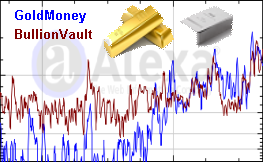
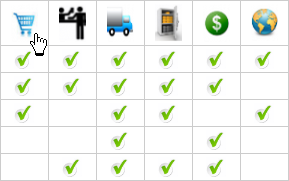
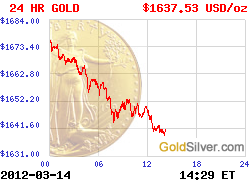
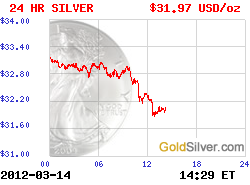
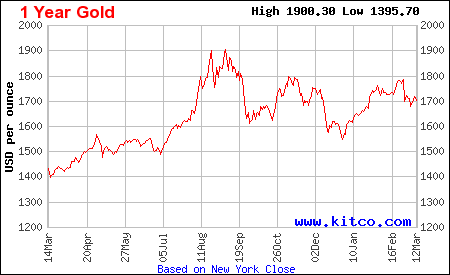 More Charts: 1-Month, 1-Year, 5-Year, 10-Year
More Charts: 1-Month, 1-Year, 5-Year, 10-Year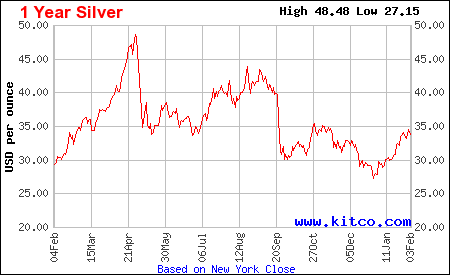 More Charts: 1-Month, 1-Year, 5-Year, 10-Year
More Charts: 1-Month, 1-Year, 5-Year, 10-Year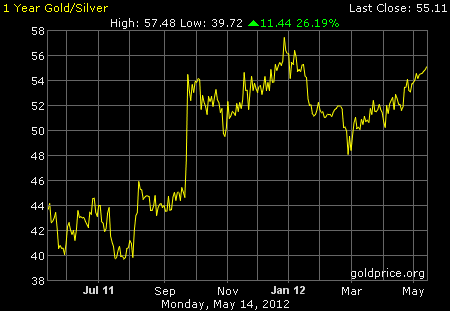
Recent Comments